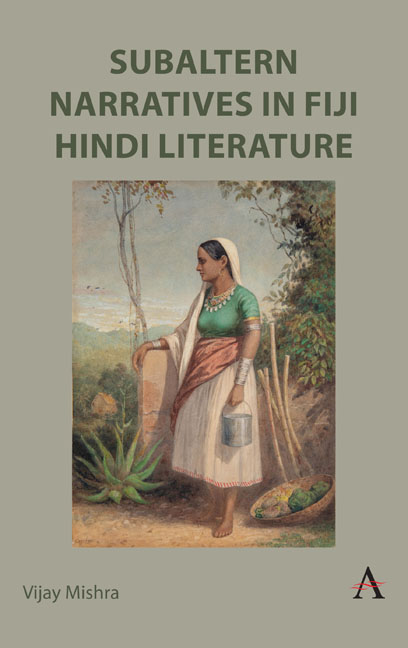Book contents
- Frontmatter
- Dedication
- Contents
- Acknowledgements
- A Note on Transliteration
- Map of Fiji
- Foreword: On the Genesis of Ḍaukā Purān
- Introduction: Reading the Fiji Hindi Demotic
- 1 Introduction: Reading the Fiji Hindi Demotic
- 2 The Moment of Ḍaukā Purān
- 3 Fījī Māṁ: The Female Subaltern Epic
- Conclusion: Can the Subaltern Speak? Language Itself Speaks
- Appendix: Glossary of Fiji Hindi and Fijian Words
- Select Bibliography
- Index
Introduction: Reading the Fiji Hindi Demotic
Published online by Cambridge University Press: 13 April 2024
- Frontmatter
- Dedication
- Contents
- Acknowledgements
- A Note on Transliteration
- Map of Fiji
- Foreword: On the Genesis of Ḍaukā Purān
- Introduction: Reading the Fiji Hindi Demotic
- 1 Introduction: Reading the Fiji Hindi Demotic
- 2 The Moment of Ḍaukā Purān
- 3 Fījī Māṁ: The Female Subaltern Epic
- Conclusion: Can the Subaltern Speak? Language Itself Speaks
- Appendix: Glossary of Fiji Hindi and Fijian Words
- Select Bibliography
- Index
Summary
One day in 2001, John O’ Carroll, then a lecturer at the University of the South Pacific, sent me a book with a note, ‘Someone sent me this book to review but I can't read a word of it. Could you please have a look at it?’ The book was Subramani's Ḍaukā Purān. I had read all the great works of literature, was moved by them, couldn't put down Don Quixote, The Brothers Karamazov, or James Joyce's Ulysses or the seven-volume Princeton translation of the Vālmīki Rāmāyaṇa. But occasionally one came across a text that moved you in a different way, a text that made you feel that you were not just reading it but ‘speaking’ and ‘writing’ it as if it were reading you. One such text was V. S. Naipaul's extraordinary A House for Mr Biswas. John O’Carroll's request posed a different kind of challenge as the book was written in a language that triggered a kind of return of the repressed: after all, it was in my mother tongue, a language that was my own secret and which I had never used in an academic discourse. But what an experience its reading was! I read the book over two or three days. I was in a daze for this was a great book, the kind of book that I would quite unabashedly place alongside the very best in the world. I had read much and had been moved by books. But this book hit me in a way so different from anything else. I don't know when I felt that Subramani was writing this book or when I was acting as the amanuensis to his voice. The book was followed by the equally magnificent Fījī Māṁ (Fiji Maa) some 18 years later. These two books have placed Subramani in the pantheon of great writers of world literature. The achievement is extraordinary, magnificent, formidable, even inimitable. They are the absolute, the defining, the definitive texts of the subaltern. Writers and critics had commented on sundry subaltern writing: how these works signified the silent underside of a national literary project, the latter invariably written in a borrowed European language (principally English and French, occasionally in Spanish and Portuguese) or in a dominant vernacular such as Hindi, Urdu, Bengali, Tamil or Arabic.
- Type
- Chapter
- Information
- Subaltern Narratives in Fiji Hindi Literature , pp. 1 - 16Publisher: Anthem PressPrint publication year: 2024



